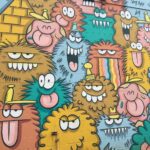Deep Analysis of “Chi: About the Movement of the Earth” Episode 5
“Chi.: About the Movement of the Earth” is an anime set in 15th-century Europe, depicting the passion and struggles of those pursuing the heliocentric theory. The original manga by Uoto has been adapted into an anime by Madhouse, capturing the clash between science and belief. This compelling story has left a lasting impression on many viewers.
In this article, we will dive into Episode 5, exploring its content, hidden themes, and foreshadowing.
Episode 5: “Even If I Die, the World Will Go On” Summary
Episode 5 focuses on the sacrifices made by those who seek the truth about the movement of the Earth. Scholars labeled as heretics continue their research despite persecution, determined to pass their knowledge on to future generations.
A key theme of this episode is “the inheritance of knowledge.” As certain scholars prepare for the possibility of their capture, they entrust their findings to the next generation. Rafau and Okuzji receive a stone box and a pendant, leading them to contemplate their significance.
Additionally, the character Hubert delivers a striking line: “The pursuit of truth requires sacrifice.” This statement serves as both a defining moment and a major foreshadowing element in the story.
Deeper Analysis of Episode 5 Themes
1. How Is Knowledge Passed Down?
This episode emphasizes that knowledge is not owned by individuals but is something that transcends generations. The stone box and pendant are not merely physical objects; they symbolize “the transmission of belief.”
Historically, those who studied the heliocentric theory faced suppression, yet they persevered in passing their knowledge to future generations. This strongly echoes real-world scientific history, reminding us of figures like Galileo and Copernicus.
2. The Meaning Behind Hubert’s Words
Hubert’s statement, “The pursuit of truth requires sacrifice,” is a central theme of the series. Seeking scientific truth often comes with great personal cost. History is filled with scholars who were ostracized or even lost their lives in their quest for knowledge.
This phrase is likely to influence the actions of Rafau and Okuzji moving forward. They are not just passive recipients of knowledge—they are becoming its guardians and future transmitters.
3. The Symbolism of the Stone Box and Pendant
In this episode, the stone box and pendant emerge as crucial narrative elements. These objects are more than just keepsakes; they represent hope and knowledge.
- Stone Box: May contain records or key discoveries about the heliocentric theory.
- Pendant: Represents the belief and ideology of its former owner.
How these items are used and their impact on the story’s progression will be essential aspects to watch.
Foreshadowing and Future Developments
Episode 5 presents several key foreshadowing elements. Here are some to keep an eye on:
- Hubert’s Words
- How will his words influence Rafau and Okuzji’s ideologies?
- Will they choose to risk everything for the pursuit of truth?
- The Fate of the Stone Box and Pendant
- What secrets does the stone box hold?
- How will carrying the pendant affect Okuzji’s destiny?
- The Spread of Heretical Ideas
- How will knowledge of the heliocentric theory be disseminated?
- Despite persecution, how will the truth continue to be passed on?
These foreshadowing elements will play a crucial role in the development of the story, making future episodes all the more intriguing.
Conclusion
Episode 5 of “Chi.: About the Movement of the Earth” deeply explores the themes of knowledge inheritance and the price of scientific discovery.
- Knowledge is not owned by individuals—it is passed down across generations.
- The pursuit of truth often requires sacrifice.
- The stone box and pendant symbolize hope and knowledge.
These themes will remain significant throughout the series. As we anticipate the next episodes, it is worth reflecting on what “knowledge” and “truth” mean in our own lives.
Stay tuned for more in-depth analysis in upcoming episodes!


